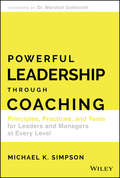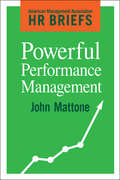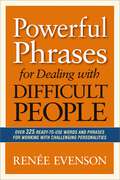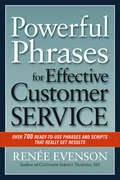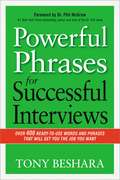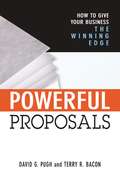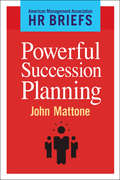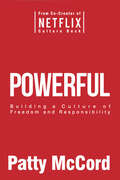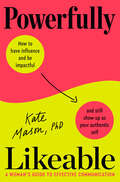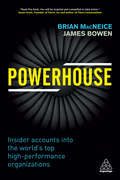- Table View
- List View
Powered by Change: How to design your business for perpetual success - THE SUNDAY TIMES BUSINESS BESTSELLER
by Jonathan MacDonald**THE SUNDAY TIMES BUSINESS BESTSELLER**Voted the EMBRACING CHANGE BOOK OF THE YEAR at the BUSINESS BOOK AWARDSWhen the winds of change blow, some build a wall and others build a windmillIn a business environment where change is the only constant, the stark reality is that it has never been harder to see what's happening around us, interpret information efficiently or develop successful strategies. This is down to both the increasing speed of change and the prevalent mindset about change, where change is seen as the enemy.Powered by Change presents a radical new methodology for using change as a fuelling mechanism to generate outstanding business success: the Windmill Theory.Power your businessThe Windmill Theory enables leaders and organisations to think and act in a way that capitalises on a constantly changing environment. Constructed of four blades working in perpetual harmony with one another, it creates an empowered business that turns the winds of change into business success.Filled with examples and stories from around the world, from global corporates to start-up ventures, Powered by Change delivers some astonishing insights and clear, actionable steps to achieve the ultimate competitive advantage.Use this book to fuel your business for the future.
Powered by Change: How to design your business for perpetual success - THE SUNDAY TIMES BUSINESS BESTSELLER
by Jonathan MacDonald**THE SUNDAY TIMES BUSINESS BESTSELLER**There's an ancient proverb that states, "When the winds of change are blowing, some build a wall and others build a windmill". In a business environment where change is the only constant, the stark reality is that it has never been harder to see what's happening around us, interpret information efficiently or develop successful strategies. This is down to both the increasing speed of change and the prevalent mindset about change, where change is seen as the enemy. Powered by Change presents a radical new methodology for using change as a fuelling mechanism to generate outstanding business success: the Windmill Theory. Power your businessThe Windmill Theory enables leaders and organisations to think and act in a way that capitalises on a constantly changing environment. Constructed of four blades working in perpetual harmony with one another, it creates an empowered business that turns the winds of change into business success. Filled with examples and stories from around the world, from global corporates to start-up ventures, Powered by Change delivers some astonishing insights and clear, actionable steps to achieve the ultimate competitive advantage.Use this book to fuel your business for the future.(P)2018 Hodder & Stoughton Limited
Powered by Happy
by Beth ThomasThe only pocket-sized book packed with ways to boost not only workplace happiness, but also your-and your company's-performanceResearch has shown that employee happiness improves the bottom line, but how can a time-crunched, stressed-out employee wedge in a little joy? Instrumental for anyone working, whether in a cubicle or a corner office,Powered by Happyoffers a quick hit of optimism for the workday, which will help your career. Employee engagement expert Beth Thomas has crafted a powerful little book filled with upbeat coaching, practical advice, and proven techniques. "Powered by Happyprovides a step by step, tip by tip strategy for figuring out what gives us joy and how to create an environment in which we can find it-all day, every day, in any situation, no matter what challenges we face. "-Larry Israelite, talent management executive"Here is a practical collection of strategies and approaches that will support and enliven the lives of employees and managers. "-Elliott Masie, chair, The Learning Consortium"Look hard into the mirror, be honest with yourself, follow Beth's advice, and become more productive andhonestly happy!"-Steven M. Lyman, vice-president, American Eagle Outfitters
Powerful B2B Content: Using Brand Journalism to Create Compelling and Authentic Storytelling
by Gay FlashmanGlobal audiences are sceptical about advertising content, banner ads and promotional messaging at the best of times. In the B2B space, building an authentic brand is even harder because buying decisions are more complicated and take much longer. Building brand trust and credibility requires time and effort. Addressing these changes, Powerful B2B Content helps readers understand the importance of building a brand narrative, and demonstrates how successful organizations can create brand journalism that has influence and impact. Using the rigour of journalistic practices and constructing content that is developed and crafted with a journalist's sensibility, B2B companies will ensure that stories are engaging and eye-catching, develop trust and attract the attention of the right audiences. Building on many years' experience in award-winning newsrooms, Gay Flashman explains what makes a great story, describes what audiences want to hear and shows the most effective way to deliver it. By demonstrating how to create focused content that is tailored to a B2B audience, Powerful B2B Content will help B2B marketers and communicators listen, observe, understand their customer's goals and deliver an experience that their customers know they can trust.
Powerful Executive Coaching
by John MattoneLeaders can make or break a company—which is why coaches are so crucial. Effective coaching can ensure that executives reach their peak potential and drive organizational results. Powerful Executive Coaching delivers a concise, but powerful look to how to coach current leaders and high potentials. It goes straight to the core components of successful coaching: assessing and enhancing the essential inner-core attributes (i.e., resilience, empathy, creativity) and outer-core skills and competencies (i.e., decision-making, critical thinking, communication) required of excellent leaders. Including carefully selected worksheets and tools, Powerful Executive Coaching explains some of the most critical skills, such as how to: handle a coaching intervention • prepare individual development plans • structure and conduct coaching effectively • interpret feedback • deal with resistance • and promote self-awareness. It’s just what you need, and only what you need, to get started on high-impact coaching that will drive leaders to success.
Powerful Exhibit Marketing
by Barry SiskindA complete guide to successful trade shows and exhibitions Trade shows, consumer shows, product launches, sporting events, and other opportunities to interact face-to-face with customers have become an important part of the marketing mix. Recent studies show that the percentage of the total marketing communications budget spent on event marketing ranged from over 9% to a staggering 29%. In 2003, North America alone hosted over 13,000 trade and consumer shows, each one with hundreds of exhibitors, and thousands of visitors. Beyond traditional trade shows, there are countless other opportunities for exhibitors to interact with their customers directly and improve the bottom line, such as mall displays, corporate events, road shows, and permanent displays. Well chosen and executed events can shorten the sales cycle significantly and put you miles ahead of the competition, but you need to have an exhibit plan that's well thought out, organized, and executed. While some large organizations have a dedicated exhibit staff, often the role of exhibit management lands on the desk of an unsuspecting, overworked, or unwilling sales or marketing person who needs to get results from their exhibit investment, but doesn't know where to start. The Power of Exhibit provides the step-by-step advice you need to exhibit successfully. This definitive guide to trade shows and other event marketing shows how to set objectives, budget for your event and measure its success in ROI, choose the right show and find the right audience, turn leads into business, design booths, work the show, gather information and intelligence, and much more.
Powerful Leadership Through Coaching: Principles, Practices, and Tools for Leaders and Managers at Every Level
by Michael K. SimpsonOn-going coaching and development that can be a “game changer” for all employees! All great coaches know how to ask good open-ended questions and how to give effective feedback. They keep a balanced and honest perspective that separates the person from the problem or issue; coaching to leverage their unique strengths and helping them improve weaknesses with a mindset focused on continuous improvement. This ongoing coaching and development can be a “game changer” for all people and teams with access to it. But what about the teams and players that aren’t empowered—or even allowed—to expand their roles? Or the team members whose careers don’t inspire or play to their natural gifts, talents, and strengths? It’s painful for any organization or manager when people on their team aren’t given the tools to succeed; and more painful still when the team member doesn’t yet realize it. But by coaching through leadership, any manager of any organization can create a supportive structure that helps assign the right roles, resources, tools, and career opportunities that will best leverage their strengths. Determines coachability and readiness for employee change and improvement Builds awareness to deal with the right issues, challenges, and opportunities Offers leaders/managers the tools to help a performer leverage their greatest gifts, talents, and strengths Allows for dialogue and tactics to close gaps in experience, communication styles, and personality Guides managers in how to have dialogue around difficult and important issues with their employees Includes coaching principles, practices, and tools with practical, real-world examples Offers strategies and tools to help employees become more motivated for effective change, action, and accountability Each chapter includes a series of powerful and provocative coaching questions for any leader or manager to use immediately in the workplace.
Powerful Performance Management
by John MattoneTo survive in today's hypercompetitive marketplace, leaders must find ways to elevate the performance of their employees. By continuously setting higher goals to strive for, strengthening employee competencies via coaching, and providing feedback to employees, leaders can create a positive performance cycle that leads to improved individual and team performance and, ultimately, stronger operating results for the organization. This action guide covers the three stages of performance management: goal-setting, coaching, and performance review. It includes step-by-step instructions and tips, the 10 elements of positive performance management, the five steps to preparing for a review, guidance on how to prepare the employees and engage them during the reviews, the most effective steps you can take to improve performance, and more.
Powerful Phrases for Dealing with Difficult People: Over 325 Ready-to-Use Words and Phrases for Working with Challenging Personalities
by Renèe EvensonIncompetent, lazy, spotlight-hogging, whiny, backstabbing, avoidant--there's no end to the personality challenges that impede workplace relationships. But interacting effectively with employees, colleagues, and bosses is essential for success. With Powerful Phrases for Dealing with Difficult People, anyone can confront problems head-on, before they fester and spread. Practical and easy to use, the book helps you identify button-pushing situations and deploy simple phrases to regain control and resolve conflicts--no matter who you're dealing with. Helpful features include: * Thirty common personality traits, behaviors, and workplace scenarios along with the phrases that work best with each * Nonverbal communication skills to back up your words * Sample dialogues that demonstrate how phrasing improves interactions * A five-step process for moving from conflict to resolution * "Why This Works" sections that provide detailed explanations Like it or not, the bulk of our waking hours are spent with people at work. This book's pithy, powerful communication tips will make those hours far more harmonious and productive.
Powerful Phrases for Dealing with Workplace Conflict: What to Say Next to De-stress the Workday, Build Collaboration, and Calm Difficult Customers
by Karin Hurt David DyeAn essential guide to master any workplace conflict with confidence and ease, have less drama, better results, and thrive at work.In many workplaces today, workplace conflict is an escalating issue. The shift to remote work and hybrid teams has left many people longing for deeper human connection. On top of this, add a younger generation clamoring for more feedback and impatient for change, steady advances in technology that can feel threatening to job security, or people reexamining priorities and quietly quitting. Take the increase in anxiety, stress, and depression, mix in the loss of human relationships, and you get less tolerance and understanding leading, ultimately, to more unresolved workplace conflict. Powerful Phrases for Dealing with Workplace Conflict is an essential resource for all employees (and their managers) who are looking for help on how to navigate frequent workplace conflicts, including with their boss and other difficult people, so they can rebuild trust, collaboration, and ultimately enjoy more influence at work. Leadership and workplace culture experts Karin Hurt and David Dye share practical and easy-to-follow tactics such as:Over 300 actual phrases you can use to deescalate common workplace conflict situations, build trust, and make better decisions.Clear examples and explanations of how phrasing will improve interactions.Critical communication tools to ensure workplace issues are addressed before they fester and become more difficult to manage.Findings, real-world cases, and inspiring stories from the World Workplace Conflict and Collaboration Survey of 5000+ people in more than 45 countries conducted by the authors.
Powerful Phrases for Effective Customer Service: Over 700 Ready-to-Use Phrases and Scripts That Really Get Results
by Renée EvensonDealing with customers isn't easy, they aren't always right or even pleasant. Business author Renée Evenson ensures you&’ll always have the right words to defuse tense interactions.Practical and insightful, this book ensures you&’ll never again be at a loss for what to say to customers.In Powerful Phrases for Effective Customer Service, she covers 30 challenging customer behaviors and 20 common employee-caused negative encounters to teach you:how to assess circumstances,choose one of many appropriate responses,and confidently and consistently deliver customer satisfaction.Helpful sample scenarios and tangible instructions bring the phrases to life, while detailed explanations bolster your confidence so that you&’ll have the right words as tools at your disposal and the skills to deliver those words effectively.By incorporating language that communicates welcome, courtesy, rapport, enthusiasm, assurance, regret, empathy, and appreciation, you&’ll not only be capable of overcoming obstacles--you&’ll strengthen all facets of your customer service.
Powerful Phrases for Successful Interviews: Over 400 Ready-to-Use Words and Phrases That Will Get You the Job You Want
by Tony Beshara Phil McGrawThe job market is full of qualified applicants--which means the next position you apply for will be filled by the candidate who gives the right answers. How confident are you that your responses are distinguishing you from the competition?When it's time to choose between a candidate who is perfect on paper and one who is persuasive in person, there&’s no contest. After all, almost every applicant who makes it to the interview process looks fabulous on a résumé. So employers have to make gut-level evaluations based on the candidates&’ answers to the interview questions.Hiring expert Tony Beshara knows the words that trigger &“yes&” in the minds of employers--and in this book, he arms candidates with hundreds of ready-to-use responses to even the toughest interview questions. Covering entry-level to executive positions and encompassing all industries, Powerful Phrases for Successful Interviews propels job seekers through every stage of the process.Beshara will show you the power phrases to:Get your foot in the doorClearly communicate your skills, strengths, and experienceMake a great impression at the crucial opening and closeScore high on the likability factorDispel lingering concerns about work historyGive follow-up emails real impactNegotiate a strong job offerPowerful Phrases for Successful Interviews provides candidates with hundreds of ready-to-use responses to even the toughest interview questions, giving professionals the right words to make the difference every time.
Powerful Presentations: Selling Your Story on Stage or In The Boardroom
by Stephen HauntsUnlock your potential and understand how you can have an audience hanging on to your every word. Entrepreneurs and business professionals often have to pitch their products and projects to an audience - whether at a conference stage, meetup group, to VC firms or even at the office to their peers and leaders. Through this book, you will learn how to plan, rehearse, and deliver the perfect presentation for your needs. You'll review different presentation styles, how to craft and structure a talk and how to make it engaging for the audience. If you've ever wondered how you can be chosen to speak at a conference, this book will show you how and go in depth on how to craft a winning talk synopsis and proposal to stand out over the competition. You'll also examine many other details that go into giving a presentation such as face and hand gesturing, pre-performance rituals like visualization techniques, time management , addressing technical difficulties, preparing for question-and-answer sessions, gathering feedback, the differences between in person events and online talks/webinars and how to mold your presentation to the medium. Powerful Presentations will show you how to perfect your public speaking and presentation skills.What You'll LearnExplore the design and structure of presentations that retain an audience’s attentionPrepare for a talk, including rehearsal, but also failure contingency planning for things like projectors, Wi-Fi, demo failure, etc.Review all of the useful tools and services available to help you develop and deliver a great presentationWho This Book Is For Professionals who want to design and deliver talks in their chosen fields of expertise, whether that be a software developer or an entrepreneur.
Powerful Presenting: Flash
by Amanda Vickers Steve BavisterThe books in this bite-sized new series contain no complicated techniques or tricky materials, making them ideal for the busy, the time-pressured or the merely curious Presenting with Flair is a short, simple and to-the-point guide to this essential skill. In just 96 pages, the reader will gain a better understanding of how to engage your audience in any situation from a conference to a wedding speech and feel at home. Ideal for the busy, the time-pressured or the merely curious, Presenting with Flair is a quick, no-effort way to discover the basics of presenting.
Powerful Presenting: Flash
by Amanda Vickers Steve BavisterThe books in this bite-sized new series contain no complicated techniques or tricky materials, making them ideal for the busy, the time-pressured or the merely curious Presenting with Flair is a short, simple and to-the-point guide to this essential skill. In just 96 pages, the reader will gain a better understanding of how to engage your audience in any situation from a conference to a wedding speech and feel at home. Ideal for the busy, the time-pressured or the merely curious, Presenting with Flair is a quick, no-effort way to discover the basics of presenting.
Powerful Professionals
by Mel Blitzer Murray HiebertThis book will supercharge your professional career. Written for any professional or leader of professionals in any field -- engineering, IT, HR, finance, public affairs, R&D, science, training, or safety, to name just a few, this Powerful Professional ebook will provide practical and insightful advice to take your career to a new level. Full of applicable, field-tested knowledge including models, tools, checklists, videos, assessments, worksheets, downloads, how-to's, as well as dos and don'ts, this e-book is a full toolkit for a professional who wants to deliver recognized results. Designed for your tablet or iPad, this first fully interactive and responsive business book can quickly enhance your technical competency with skills that open the doors to more influential roles as a professional. Based on learning from over 1,200 workshops delivered in 23 countries to over 17,000 participants and underpinned by research from 65,000 surveys, the authors share both their findings and key insights into what knowledge and skills are the hallmarks of high performing professionals.
Powerful Proposals: How to Give Your Business the Winning Edge
by David Pugh Terry BaconHow does a company constantly win more business than its rivals? A key factor is the ability to create proposals that outshine those from even the strongest competitors. Powerful Proposals helps businesses maximize the selling power of their proposals, with proven strategies for going beyond "this is what we do" documents in favor of customer-centered offers that highlight the tangible benefits your company offers. This powerful process offers tools and techniques that will let any firm: * assess their "winner or loser" proposal status and take proactive steps to become a winner * address the ""Big Four"" questions that a proposal must answer to be successful * create "A+" proposals in less time with less wasted effort via a simple, repeatable process * neutralize the issue of price when the firm is not the low-price provider Powerful Proposals takes readers step by step through designing executive summaries, writing themes, and generating the text. There is also valuable information on strategy, graphics, callouts, and other visual elements.
Powerful Succession Planning
by John MattoneA crisis in executive talent is on the horizon as retirement looms for a large percentage of leaders. In our increasingly knowledge-driven economy, organizations are right to fear this “brain drain,” suspecting that when executives leave the firm, business may follow. Yet high-potential candidates account for less than 8 percent to 10 percent of the talent pool. Identifying, developing, and retaining these emerging leaders is a mission-critical challenge for CEOs, senior executives, managers, and HR directors.Powerful Succession Planning provides an overview of how to develop a succession planning and management program. Leadership expert John Mattone covers all the “nuts and bolts” of an effective program and provides readers with a Succession Planning Map™ to guide them through the process. Readers will learn how to measure and calibrate performance, potential, and readiness using nine key assessments. Last but not least, a succession management diagnostic tool enables any organization to quickly gauge the health of its succession planning process.
Powerful Women Plan for Retirement: Take Ownership of Your Financial Future
by Debra K. MenkeMake a plan now and manifest a rewarding and abundant retirement: “A book that countless women are waiting for.” ?Marianne WilliamsonCoach and personal finance professional Debra K. Menke spent years watching powerful women not properly plan for retirement. To help this strong tribe of women take ownership of their financial freedom, she offers this love letter as a route to retirement success. In Powerful Women Plan for Retirement, Debra helps women to: Figure out exactly how much money they’ll need in order to retire Quit guessing whether they’ll be ready to retire in ten years Create a solid retirement plan and never stress about it again Ensure their plan doesn’t fall apart, even when life happens Plan their exit strategy and start living the life of their daydreams
Powerful: Building a Culture of Freedom and Responsibility
by Patty McCordNamed by The Washington Post as one of the 11 Leadership Books to Read in 2018 When it comes to recruiting, motivating, and creating great teams, Patty McCord says most companies have it all wrong. McCord helped create the unique and high-performing culture at Netflix, where she was chief talent officer. In her new book, Powerful: Building a Culture of Freedom and Responsibility, she shares what she learned there and elsewhere in Silicon Valley. McCord advocates practicing radical honesty in the workplace, saying good-bye to employees who don’t fit the company’s emerging needs, and motivating with challenging work, not promises, perks, and bonus plans. McCord argues that the old standbys of corporate HR—annual performance reviews, retention plans, employee empowerment and engagement programs—often end up being a colossal waste of time and resources. Her road-tested advice, offered with humor and irreverence, provides readers a different path for creating a culture of high performance and profitability. Powerful will change how you think about work and the way a business should be run.
Powerfully Likeable: A Woman's Guide to Effective Communication
by Kate Mason PhDA groundbreaking new roadmap for female success—how to be influential, respected, and well-liked at work, at home, and beyond—from a leading business coach and communication expert.&“The competence-likeability bias is an absurd catch-22, but never fear! In this compelling, compassionate, and funny read, Kate Mason shows you how to break free.&”—Kim Scott, author of the New York Times bestseller Radical CandorWomen all over the world struggle to communicate with authority yet still be liked by a crowd. We strategize before meetings, second-guess in bathroom stalls, text outfit options to our best friends, and try to anticipate every possible variable. This tricky business is what world-champion debater and executive coach Kate Mason calls &“communicating while female&” and, frankly, it seems like it&’s impossible to get it right.Until now. In Powerfully Likeable, Mason explains that being influential and well-liked is not an either/or proposition. Furthermore, she shows that women don&’t have to imitate what men do; gaining respect doesn&’t mean having the loudest voice or the firmest handshake. Instead, the key is to choose communication tools that amplify what makes you unique—whether that be warmth, humor, competitiveness, or a love of data—and wield your power from a place of authenticity. From personal presentation style and negotiation to handling adversarial conversations and becoming your own best advocate, Mason offers a game-changing tool kit of strategies, including• scripts for owning your accomplishments instead of downplaying them and defending your ideas without being defensive• methods for using clear logic, evidence, and debate strategies to ask and answer clear questions without appearing &“difficult&”• tips for overcoming &“Imposing Syndrome&”—the disease of playing small and not taking up space—and channeling warmth as an alternative to deference in conversation• techniques to regulate your body language, voice, and words to find your true communicative powerA paradigm-shifting guide to dismantling and thinking beyond stereotypes, Powerfully Likeable will help you unleash your creative power and energy and embark on a journey of success on your terms.
Powerhouse
by Mike ClaytonBe a force to be reckoned with. Be a Powerhouse.Are you owning everything in your life? Are you in control, with a plan, making everything you do count? Are you performing optimally and making an impact? If not, why not? It's time to step up and be bold, be effective, be a Powerhouse. Let Mike Clayton show you how to raise your personal effectiveness to dynamic levels and completely overhaul your life at work and at home. Lock down your purpose then develop the forceful focus of a true achiever. You'll learn how to make solid decisions, stand up for those decisions and garner unwavering support from others. You'll find expert advice for deciding what matters, and practical tips for turning intentions into determined actions so you can achieve what you want.As a powerhouse you'll be able to meet any challenge head on and deal with anything. You'll be performing at your peak and firmly on your way to outstanding success.Define your purpose and boost your focus and performanceMake the right choices about how you spend your timeBe someone everybody wants to work with to get stuff doneHave a clear, strategic approach to your productivityA true powerhouse bursts with energy and purpose, elevating the performance and brightening the outlook of everyone around them. To get there, you need to drill down to the core of your problems, and craft a strategic solution. Powerhouse provides the roadmap, and you just need to begin the journey.
Powerhouse Principles
by Donald J. Trump Jorge PerezThe #1 private developer in the U.S., Jorge Pérez reveals his billionaire secrets for power investors.BR> Known as the King of Condominiums and the Steven Spielberg of Real Estate, top developer Jorge Pérez reveals his principles for achieving success in even the toughest real estate market through a clear, step-by-step process. Pérez specifies effective business tactics that will lead to evergreen profits, including: ? Key points to smart investing ? Cardinal rules for picking and building property ? Commandments on negotiating the best deal ? Valuable tips on securing equity ? Steps for successfully selling property Finally, Pérez explains how to manage and grow investments over the long term. Emphasizing the importance of staying flexible in an ever-changing market, Pérez offers personal anecdotes, key business philosophies, and top insider methods to inspire and motivate any investor or entrepreneur to achieve the ultimate success in real estate.
Powerhouse: Insider Accounts into the World's Top High-performance Organizations
by James Bowen Brian MacneiceWhy are the New Zealand All Blacks the best rugby team in the world? How does the Kirov Ballet produce generation after generation of exceptional ballerinas? How did Southwest Airlines evolve from being an idiosyncratic Texan airline to become one of the most successful businesses internationally? How does the Finnish School Education System deliver great results by breaking conventions? Powerhouse uncovers the performance secrets of some of the most impressive organizations around the world and reveals the key principles they have in common to enable any business to raise their own bar. To understand what makes these organizations great, MacNeice and Bowen have conducted immersive and personal research; investigating their culture, interviewing their leaders and observing their everyday practice. Despite this diverse range of seemingly contrasting industries - business, sport, technology, finance, the arts - each of these successful institutions share a common bond: they are world-class industry leaders and have repeatedly outperformed their competition. Powerhouse explores what lessons can be learnt from these organizations to provide a unique and in-depth analysis of how enduring high performance can be developed.
Powerhouse: The Untold Story of Hollywood's Creative Artists Agency
by James Andrew Miller<P>An astonishing--and astonishingly entertaining--history of Hollywood's transformation over the past five decades as seen through the agency at the heart of it all, from the #1 bestselling co-author of Live from New York and Those Guys Have All the Fun. <P>The movies you watch, the TV shows you adore, the concerts and sporting events you attend--behind the curtain of nearly all of these is an immensely powerful and secretive corporation known as Creative Artists Agency. Started in 1975, when five bright and brash employees of a creaky William Morris office left to open their own, strikingly innovative talent agency, CAA would come to revolutionize the entertainment industry, and over the next several decades its tentacles would spread aggressively throughout the worlds of movies, television, music, advertising, and investment banking. <P>Powerhouse is the fascinating, no-holds-barred saga of that ascent. Drawing on unprecedented and exclusive access to the men and women who built and battled with CAA, as well as financial information never before made public, author James Andrew Miller spins a tale of boundless ambition, ruthless egomania, ceaseless empire building, greed, and personal betrayal. It is also a story of prophetic brilliance, magnificent artistry, singular genius, entrepreneurial courage, strategic daring, foxhole brotherhood, and how one firm utterly transformed the entertainment business. <P>Here are the real Star Wars--complete with a Death Star--told through the voices of those who were there. Packed with scores of stars from movies, television, music, and sports, as well as a tremendously compelling cast of agents, studio executives, network chiefs, league commissioners, private equity partners, tech CEOs, and media tycoons, Powerhouse is itself a Hollywood blockbuster of the most spectacular sort. <P><b>A New York Times Bestseller</b>






